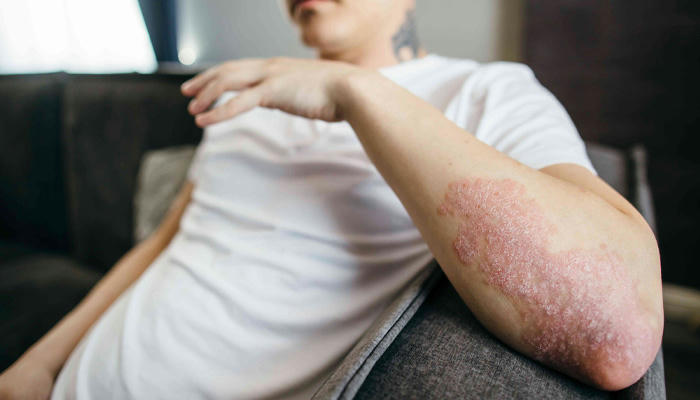Understanding Plaque Psoriasis: Symptoms and Treatment Options

What Is Plaque Psoriasis?
Plaque psoriasis stands as the most prevalent form of psoriasis—a skin disorder characterized by itchy, inflamed patches. These patches, known as plaques, are often red or purple with a whitish layer of dead skin cells. Commonly appearing on areas like the elbows, knees, scalp, and back, these plaques can develop anywhere on the body.
Though plaque psoriasis is a chronic condition, treatments are available to manage and alleviate symptoms, even though a complete cure remains elusive.
Recognizing the Symptoms of Plaque Psoriasis
The primary indicator of plaque psoriasis is the presence of plaques, which vary in color from red and brown to purple and gray, depending on skin tone. These plaques are often covered with a white or silvery coating and can be seen on both sides of the body; for instance, if a plaque appears on one elbow, it may also appear on the other.
Typical symptoms include:
•Itching
•Pain
•Skin cracking
•Bleeding
•Burning or stinging sensations
These symptoms can recur throughout a person's life, making ongoing management essential.
Understanding the Causes of Plaque Psoriasis
The exact cause of plaque psoriasis remains unclear, but it is widely recognized as an autoimmune disorder. In this condition, the immune system mistakenly targets healthy skin cells as if they were invaders, leading to an accelerated production of new skin cells. This rapid cell growth results in the formation of thick, scaly patches on the skin.
The development of plaque psoriasis is influenced by both genetic factors and individual health conditions:
Genetics: Psoriasis often runs in families. Over 20% of those affected by the condition report having a family member with the same issue. Research suggests that if both parents have psoriasis, there's a roughly 50% chance their children will develop it.
Triggers: Various factors can activate the immune response that leads to psoriasis flare-ups. Common triggers include:
•Skin injuries
•Dry skin
•Certain foods and beverages
•Severe sunburn
•Medications, such as lithium or antimalarial drugs
•Infections like strep throat
•Stress
•Smoking
•Alcohol consumption
Can You Catch Plaque Psoriasis?
No, plaque psoriasis is not contagious. It cannot be transmitted through physical contact or any other means of close interaction.
Diagnosing Plaque Psoriasis

To determine if you have plaque psoriasis, a dermatologist will typically start by discussing your medical history and examining your skin. However, because psoriasis can resemble other skin conditions like eczema, a precise diagnosis might require additional steps. In some instances, a skin biopsy is necessary. This involves removing a small sample of your skin to analyze the cells under a microscope. Your doctor may also perform allergy or blood tests to exclude other potential causes.
Managing Plaque Psoriasis
While there is no cure for plaque psoriasis, treatments can help manage symptoms and reduce the frequency of flare-ups. Treatment aims to lessen the severity of the rash and improve your skin's appearance. Options include topical treatments, light therapy, and systemic medications.
•Topical Treatments:
For mild cases, topical medications are often the first line of defense. These creams and ointments are applied directly to the affected areas to reduce inflammation and slow skin cell growth. Commonly used topical treatments include corticosteroids and anthralin. Over-the-counter options, such as salicylic acid and coal tar, can also be effective for managing milder forms of psoriasis.
•Light Therapy:
When plaques cover a larger area, ultraviolet (UV) light therapy might be recommended. This treatment can be administered in a medical office or with a special home device. UV light helps slow down skin cell production and can alleviate symptoms.
•Systemic Medications:
If topical treatments and light therapy don't provide sufficient relief, systemic medications might be necessary. These drugs work throughout the body to control psoriasis more comprehensively. They either suppress the immune system or slow skin cell growth. Systemic options include oral medications like acitretin, cyclosporine, and methotrexate, or injections.
•Biologic Drugs:
Biologics are a type of systemic medication that specifically targets the immune system. These drugs are administered through injections or infusions and include:
Adalimumab (Humira)
Brodalumab (Siliq)
Certolizumab pegol (Cimzia)
Deucravacitinib (Sotyktu)
Etanercept (Enbrel)
Golimumab (Simponi)
Guselkumab (Tremfya)
Infliximab (Avsola, Inflectra, Remicade)
Ixekizumab (Taltz Autoinjector, Taltz Syringe)
Risankizumab (Skyrizi)
Secukinumab (Cosentyx)
Tildrakizumab (Ilumya, Ilumetri)
Tofacitinib (Xeljanz)
Ustekinumab (Stelara)
These medications target specific immune cells or proteins involved in inflammation but may increase the risk of infections. Systemic drugs and biologics can have significant side effects, including depression, liver issues, or a higher risk of skin cancer. It is essential to discuss these risks and benefits thoroughly with your healthcare provider to choose the best treatment plan for you.
Managing Life with Plaque Psoriasis

For many, plaque psoriasis is a long-term condition, but there are strategies to help manage it effectively:
•Identify and Avoid Triggers:
While psoriasis itself isn't caused by external factors, certain triggers can exacerbate symptoms. Identifying and avoiding these triggers can help manage flare-ups. Common triggers include:
Alcohol
Allergies
Cold, dry weather
Hormonal changes
•Monitor Your Diet:
Certain foods may worsen your psoriasis. Observing your diet and avoiding known triggers can make a difference. Foods that often provoke flare-ups include:
Dairy products
Citrus fruits
Gluten (found in wheat)
Nightshade vegetables like tomatoes, peppers, and potatoes
•Incorporating an anti-inflammatory diet may provide relief. Consider including:
Fatty fish (like mackerel and salmon)
Leafy greens (such as spinach and kale)
Olive oil
•Care for Your Skin:
Maintaining skin health is crucial. Regular moisturizing can help keep plaques soft and reduce itchiness. Avoid harsh soaps, and consider soothing baths with colloidal oatmeal or Epsom salts. For scalp psoriasis, medicated shampoos may be beneficial.
•Seek Emotional Support:
Dealing with plaque psoriasis can be emotionally challenging. Feelings of self-consciousness and stress are common. If you're feeling overwhelmed or depressed, speak with your doctor about counseling or medication. Connecting with others who understand your experience can also provide comfort and practical advice.
•Collaborate with Your Doctor:
Regular communication with your healthcare provider is key. Discuss your symptoms, treatment progress, and any changes you notice. Your treatment plan may need adjustments over time. Avoid abruptly stopping medications, as it could lead to worsened symptoms or complications. Stay alert for signs of psoriatic arthritis, such as joint pain, and report these to your doctor promptly.
Common Questions About Plaque Psoriasis
•Is Plaque Psoriasis Caused by Fungus?
No, plaque psoriasis is not a fungal infection. It is an autoimmune disorder, which means it occurs when your immune system mistakenly attacks healthy skin cells.
•Should You Peel Off Plaques?
No, you should avoid peeling plaques. Doing so can aggravate the condition and lead to more irritation or potential infection.
•Does Plaque Psoriasis Worsen with Age? Plaque psoriasis itself does not necessarily worsen with age. However, aging can bring changes that might trigger or intensify flare-ups, such as increased stress, a weakening immune system, certain medications, or thinning skin. Regular consultations with your doctor are important to adjust your treatment plan as needed.
•Can Drinking Water Help Plaque Psoriasis?
Yes, staying hydrated is beneficial for skin health. Since dry skin can trigger flare-ups, drinking plenty of water helps maintain skin moisture and may reduce symptoms.
•Is Vaseline Effective for Plaque Psoriasis?
Absolutely. Petroleum jelly, or Vaseline, is a practical and affordable way to keep both your plaques and the rest of your skin moisturized.
•What Are the Risks of Untreated Plaque Psoriasis?
Untreated plaque psoriasis can lead to worsening symptoms and impact your quality of life. Additionally, psoriasis is associated with a higher risk of other health issues, such as cardiovascular disease and digestive disorders. It is essential to work with a healthcare provider to manage your condition and monitor for any potential complications.
